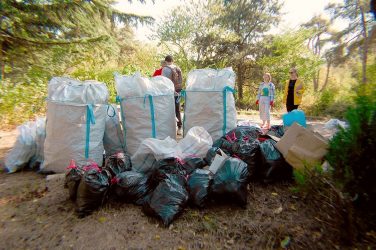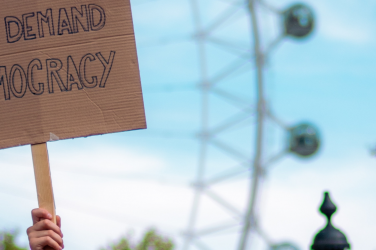Iran’s nuclear programme has been a serious concern for decades. E&M examines what the JCPOA means for Europe and its allies. Will this result in access to a huge array of new market opportunities?

After a gruelling 18 days in Vienna, P5+1, EU and Iranian negotiators emerged from talks over Iran’s nuclear program to present their resolution to the world – the Joint Comprehensive Plan of Action (JCPOA – a summary of which is available here). In a joint statement by Mohammad Javad Zarif, Iran’s chief negotiator, and Federica Mogherini, the EU’s High Representative for Foreign Affairs and Security Policy, the two leaders announced that a deal had been reached in the early hours of Tuesday 14 July. They praised the “courage, political will, mutual respect and leadership” between nations that facilitated a final agreement.
While hashing out the deal’s final details, however, Zarif and Mogherini came head to head in a debate on the status of an arms embargo upheld by a UN Security Council resolution. When Mogherini threatened to walk out of the negotiations, Zarif warned, “Do as you like, but don’t threaten an Iranian”. Russian foreign minister Sergei Lavrov, backing up Zarif, joined in to assert, “And don’t threaten a Russian.”
The row was quickly resolved, as were others like it throughout the seemingly endless round of negotiations, but the dispute exemplifies more than the stubbornness of global leaders. It represents a web of energy politics in which the EU, Russia, and Iran will find themselves as the effects of sanctions relief take hold.
The EU-Russia Dynamic
Russia’s complicated relationship with Europe is based largely upon its prowess as an energy giant. It contains the largest natural gas reserves in the world – 32.6 trillion cubic meters, according to British Petroleum’s 2015 Statistical Review of Energy. Endowed with a developed infrastructure for production and a bountiful capacity of resources to exploit, Russia provides the EU with 40 percent of the gas consumed throughout Europe. This supply-and-demand relationship has functioned well in a stable diplomatic environment. But a flare-up of EU-Russian tension following the Ukraine crisis, regional conflict in North Africa and increased import prices as a result of high demand from Asia led to record low EU liquefied natural gas (LNG) imports in 2014.
On one hand, Russia depends upon EU member states as loyal customers. On the other hand, its increasingly unpredictable politics in the EU’s eastern neighborhood have made Russia a potential threat to Europe and its allies. The direct effects of nefarious external affairs upon member state energy markets have driven the European Commission under current President Donald Tusk to consider expanding the EU’s Energy Community Treaty into a European Energy Union. Among its main tenets, the new institution would seek to develop relationships with Europe’s neighbors to promote a more competitive and efficient network of energy suppliers.
The EU-Iran Dynamic
The EU plans to lift economic sanctions on Tehran once Iran complies with its responsibilities outlined in the JCPOA – sanctions that, since 2012, have crippled the Iranian economy with embargoes on everything from investment and banking to oil and gas.
Iranian businesses hope for foreign investment, while the Iranian public is counting on having unhindered access to high-quality European goods, not to mention renewed access to European markets to continue selling fine goods such as Iranian pistachios, carpets and saffron.
As the New York Times recently reported, European business executives and analysts consider opportunities in Iran to be seductive. Despite European concerns regarding the United State’s decision to leave sanctions in place until the U.S. Senate votes to implement or disregard the Iran Deal, French and German leaders have already proceeded in re-awakening old relationships with Iran. Germany sent a delegation five days following the Iran agreement’s release, and French foreign minister Laurent Fabius paid a visit to Tehran soon after. In addition to easier access to exotic food and luxury items, this final deal raises questions in European minds about what it could mean for their energy options.

Iran: The EU’s New Gas Partner?
According to the European Commission’s EU trade profile, most imports from Iran are energy related. They remained so until 2012, when the EU took part in an international sanctions regime meant to punish Iran for violating the Nuclear Non-Proliferation Treaty and to discourage its leaders from further developing its nuclear program. In 2012, before the effects of these sanctions took hold, the EU reported €5.7 billion in Iranian imports. In 2013, following the implementation of sanctions, EU imports decreased to €0.8 billion. After the Iran Deal is implemented and international sanctions are lifted, European businesses and consumers will be uninhibited from accessing a massive energy market. Could this mean that Iran might become one of the EU’s primary energy partners? The technical answer is yes, once sanctions are lifted by January 2016.
Tina Mashreghi-Bajestani, an energy policy master’s student at Sciences Po’s Paris School of International Affairs, believes the forecast is promising. “Europe needs Iran as an energy partner as much as Iran needs Europe as a trade partner … given the current geopolitical situation”, said Mashreghi, referring to Russia’s threats to cut the supply of gas to Ukraine due to payment disputes. Anticipating a resolution, concerned businesses have gone as far as establishing a European-Iranian Business Alliance to promote a quick and profitable turnaround. Iran is estimated to have the world’s second-largest oil reserves on the globe and has long relied on its own LNG sources for domestic consumption. Meanwhile, Europe’s domestic LNG production has suffered a decline, forcing the EU to look toward Azerbaijan and Kazakhstan as new partners. As Reuters reported in March, the EU intends to revive a gas pipeline project called the Trans-Anatolian natural gas pipeline (TANAP) that will run through Russia, Kazakhstan, Turkmenistan, Iran, and Azerbaijan. The renewed project exemplifies the EU’s commitment to fostering relationships with new international energy partners. TANAP also focuses on the import of natural gas, which France’s energy company Total projects will represent 14% of Europe’s energy consumption by 2020.
Under pressure to foster deeper ties with mightier gas suppliers, and in order to meet future energy demands, the EU’s investment in more projects like TANAP may be necessary. But European energy companies need not look much further. This year, Iran renewed commitments to build its sixth pipeline running from its South Pars gas field. It will be capable of sending gas westward to Iraq, as well as to Central and Eastern Europe.
Aside from energy, advances in the European-Iranian relationship are under way. Mashreghi-Bajestani, who is Iranian-Canadian and has family living in Iran, says that the opportunity to re-enter the global economy is what Iranians are anticipating most. “They’re holding back on spending in hopes that once sanctions are lifted, prices decrease and better quality imports become available”. German and French diplomats have already begun to temper diplomatic ties with Iran, setting the stage for eager businesses to strike early in what they expect to be an import-export gold rush.
Teaser photo: Jim.henderson (Wikimedia Commons); Licence: CC by 1.0





